Did you know that over 70% of garage floor damage occurs in winter—primarily due to moisture seeping into the concrete, freezing, and causing expensive cracks? Whether you use your garage for parking, storage, or as a workshop, winter’s freeze-thaw cycles and road salt pose real threats. Garage floor waterproofing for winter is your most effective defense against these seasonal hazards. In this guide, learn how to protect your concrete garage floor, maximize longevity, and avoid costly repairs with expert waterproofing solutions and smart choices in floor coatings and mats.
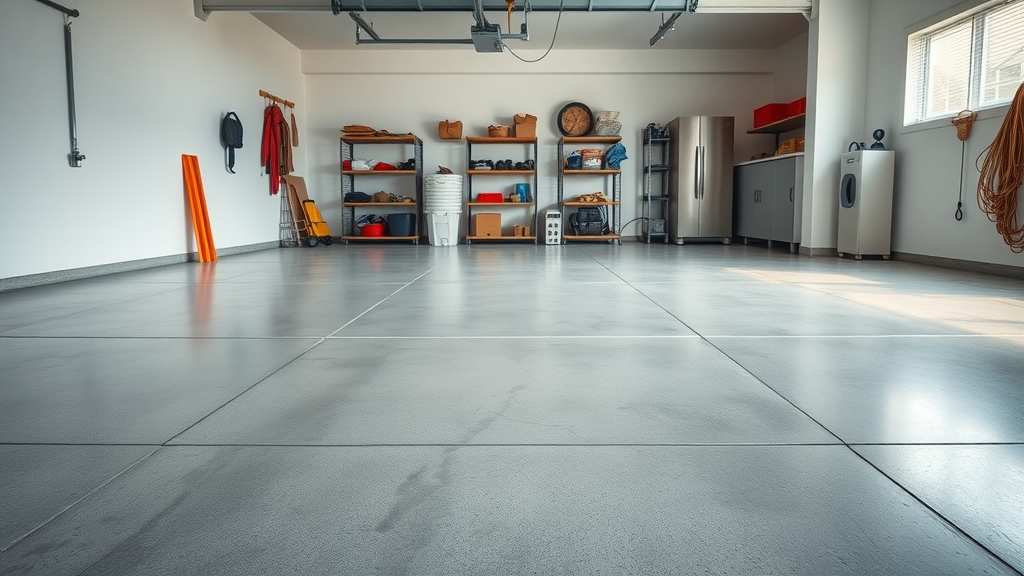
Startling Facts: Why Garage Floor Waterproofing for Winter Is Essential
Many homeowners underestimate the impact of winter on their garage floor. When snow, sleet, and rain mix with chemicals like road salt, the result can be a corrosive blend that seeps into your concrete floor. The freeze-thaw cycle causes water to expand and contract inside the concrete pores, resulting in cracks, spalling, and long-term structural weakness. With every passing winter, garage floors that lack waterproofing suffer progressive damage, leading to slipperiness, unsightly pits, and—over time—expensive repairs. Understanding and prioritizing garage floor waterproofing for winter now saves you money and headaches later.
"According to industry data, over 70% of garage floor damage during winter is caused by moisture infiltration and freeze-thaw cycles."
What You'll Learn About Garage Floor Waterproofing for Winter
The science behind garage floor waterproofing for winter
Effective protection options, from floor coatings to mats
Step-by-step process for waterproofing your garage floor
Key factors to consider before starting your project
Common mistakes to avoid during winter waterproofing
Comparing epoxy coating, garage floor coating, and other solutions
Understanding Garage Floor Waterproofing for Winter
How Moisture and Cold Affect Your Garage Floor
Winter brings a unique set of challenges for garage floors. Moisture from melted snow, slush, and rainwater often accumulates on your concrete floor, seeping into tiny pores and cracks. When temperatures drop, this moisture freezes and expands, causing the concrete to crack and deteriorate—a process known as the freeze-thaw cycle. Add to this the corrosive effects of road salt and chemicals, and the damage can accelerate dramatically. Beyond surface-level issues, repeated exposure to winter moisture compromises your concrete garage’s long-term structural integrity, lowers home value, and creates slippery, hazardous surfaces for your family and vehicles.
This is why waterproofing your garage floor becomes non-negotiable for homeowners who want to maintain a clean, safe garage during the harshest time of the year. When ignored, even a small overlooked crack can become the entry point for damaging moisture. Protecting your garage floor with high-quality floor coatings, floor mats, and regular maintenance helps prevent these issues and keeps your home garage inviting all winter.
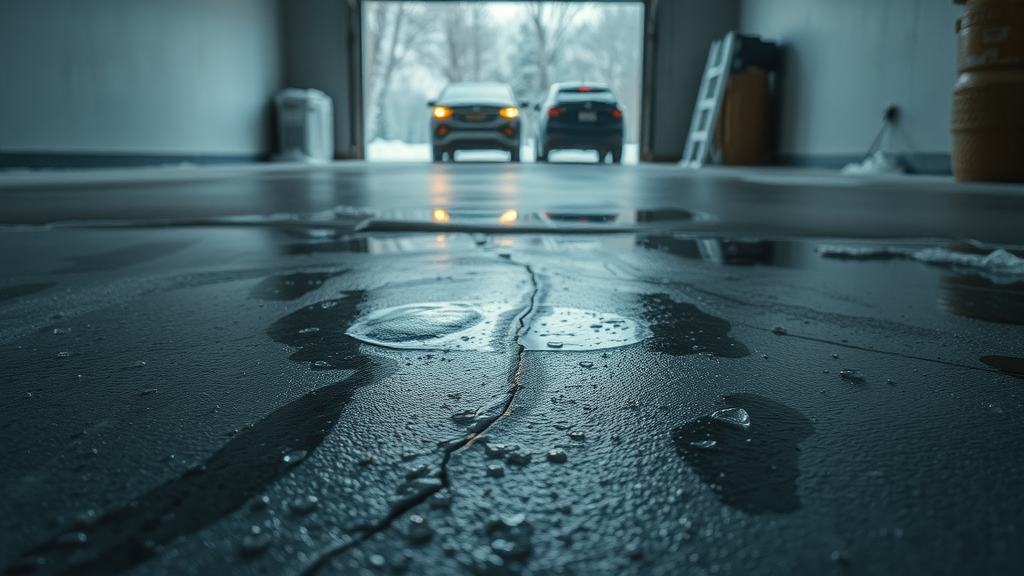
Why Garage Floor Waterproofing for Winter Is the Best Defense
Investing in garage floor waterproofing for winter offers the ultimate layer of protection against winter damage. Unlike temporary fixes, waterproofing creates a resilient barrier that blocks moisture, de-icing chemicals, and road salt from penetrating your garage floor. This proactive approach not only extends the lifespan of your concrete floor but also saves thousands of dollars in potential repairs caused by untreated cracks, mold growth, or slick surfaces. Modern floor coatings and floor mats are engineered for winter resilience, providing a non-slip, moisture-resistant surface perfect for both everyday use and extreme conditions.
By choosing the right floor coating—such as epoxy coating or polyurea—you can create a seamless finish that withstands abrasions, chemical attacks, and heavy workloads. Pair these with specialized floor mats and snow mat solutions to capture drips, de-icing slush, and winter debris, offering an integrated system for year-round defense. Simply put, waterproofing your garage floor is the best strategy for preserving your investment, functionality, and family’s safety during the winter season.
Choosing the Right Garage Floor Coating and Floor Mats for Winter Protection
Epoxy Coating vs. Alternative Floor Coatings for Garage Floors
When it comes to garage floor coating for winter, not all products offer the same level of defense. Epoxy coating has become a popular choice due to its robust sealing properties, seamless finish, and capacity to resist road salt, stains, and freeze-thaw conditions. However, recent innovations like polyurea and polyurethane coatings have challenged epoxy’s dominance by boasting faster curing times, improved flexibility, and superior durability in extreme cold.
While both epoxy floor and polyurea options deliver a protective, glossy layer, deciding factors often come down to application temperature range, expected curing time, and the level of traffic in your garage. For DIYers, user-friendly water-based epoxy systems are accessible, but always check manufacturer recommendations for winter installations. Ultimately, choosing a high-performance floor coating, whether it’s epoxy or an alternative, is essential for keeping your concrete floor safe through winter’s challenges.
Comparing Garage Floor Mats, Floor Coating, and Snow Mat Solutions
In addition to liquid-applied coatings, garage floor mats and snow mat systems provide fast, flexible protection options. Floor mats are easy to install and can be rolled out for instant moisture and salt containment—perfect if you want a low-commitment alternative or an added layer on top of coatings. Snow mat solutions target high-traffic or vehicle parking zones, trapping slush and melted snow before it can reach your concrete.
While mats lack the seamless, permanent coverage of epoxy coatings or polyurea, they excel at capturing mess, are easy to clean, and can be replaced seasonally. Combining floor mats with a robust garage floor coating offers the best of both worlds—a durable surface seal paired with disposable or washable containment for winter debris. This approach meets a balance of durability, aesthetics, and ease of maintenance for many homeowners facing persistent winter mess.
Comparison Table: Garage Floor Coating vs. Floor Mats vs. Floor Paint vs. Epoxy Coating
Product |
Main Benefit |
Durability |
Ease of Installation |
Winter Protection |
Maintenance |
Cost |
|---|---|---|---|---|---|---|
Epoxy Coating |
Seamless, strong barrier |
High |
Moderate (some prep required) |
Excellent |
Low |
$$$ |
Floor Paint |
Simple surface color/protection |
Low-Medium |
Easy |
Limited |
Medium |
$ |
Garage Floor Mat |
Quick, removable surface cover |
Medium |
Easy (roll out/pick up) |
Very Good |
Easy |
$$ |
Snow Mat |
Captures slush/snow at entry points |
Medium |
Very Easy |
Very Good |
Easy |
$$ |
Polyurea/Polyurethane Coating |
Fast cure, flexible barrier |
Very High |
Moderate (pro install best) |
Excellent |
Low |
$$$$ |
Preparation Steps for Garage Floor Waterproofing for Winter
Testing for moisture on your concrete floor
Properly cleaning garage floors before application
Choosing the right floor coatings and materials
Getting the most out of garage floor waterproofing for winter means thorough, methodical prep. Start by testing your concrete floor for hidden moisture—tape down a plastic sheet overnight; if condensation forms underneath, let the floor dry completely or use a dehumidifier. Next, thoroughly clean the surface with a degreaser and stiff brush to remove oil, old sealers, grime, and dust that can prevent proper adhesion.
Assess your floor for cracks or surface flaws. Use quick-setting patch or epoxy fillers to repair chips and holes—this step is crucial for achieving a bond between the floor coatings and your garage floor. Finally, carefully select your waterproofing product based on temperature compatibility, expected traffic, and whether you want a DIY or professional application. Considering these preparation steps leads to a flawless and long-lasting finish.
Step-by-Step Guide: How to Waterproof Your Garage Floor for Winter
Clean and repair existing garage floor surface: Remove dirt, stains, and patch all cracks or holes for a smooth base.
Test for existing sealants or coatings: Sprinkle water; if it beads, a prior sealer must be removed before proceeding.
Select appropriate waterproofing your garage floor materials: Choose between epoxy coating, polyurea, or high-quality floor paint/coating based on your winter needs.
Apply epoxy coating or preferred floor coating: Mix and roll out your product evenly per manufacturer directions, working in sections for hardest-to-reach areas.
Install floor mat or snow mat for additional protection: Once cured, lay out heavy-duty floor mats or snow mats where cars enter or as needed for slush containment.
Cure and inspect the waterproofed garage floor: Allow full curing time before parking your car or storing heavy items. Inspect for missed spots or touch-ups as needed.
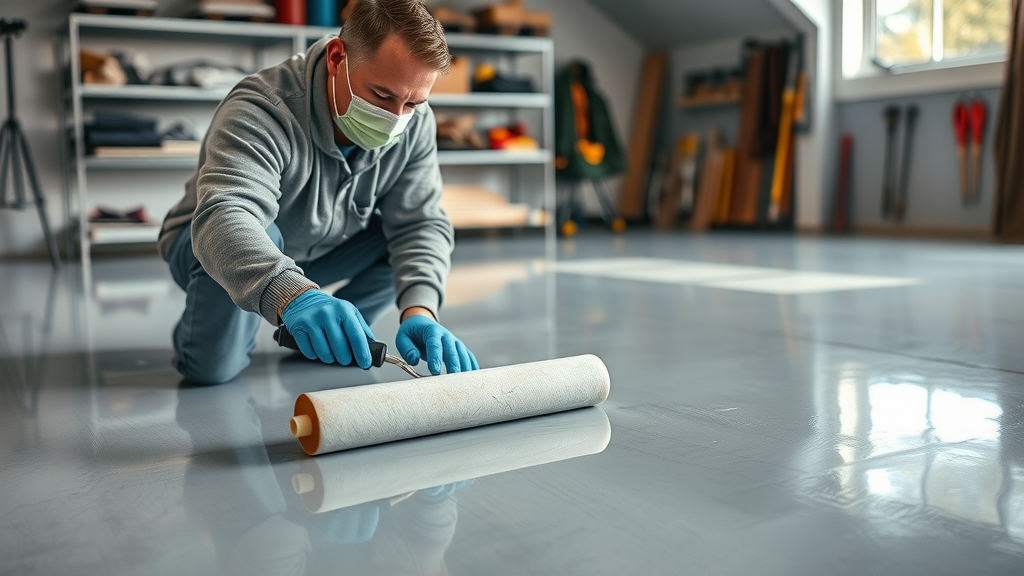
Common Mistakes to Avoid in Garage Floor Waterproofing for Winter
Ignoring moisture levels of your concrete floor
Applying floor paint or coatings incorrectly
Choosing subpar floor coatings or floor mats
Poor preparation before waterproofing your garage
Skipping moisture testing can sabotage your entire project, causing bubbling or peeling in your floor coating. Rushing through cleaning or failing to remove existing sealers means your new finish won’t bond properly, reducing effectiveness and longevity. Choosing cheap, untested floor mats or off-brand floor coatings may save money short-term, but are more likely to fail under winter’s extreme temperature swings and daily use. To truly succeed at waterproofing your garage floor, invest in proper prep and premium materials, follow manufacturer guidelines, and never skip crucial steps like curing or initial surface repairs.
Advanced Tips and Protection Options for Extreme Winter Conditions
Layering epoxy coatings and floor mats for maximum defense
Special considerations for high-traffic garages
Recommended products for waterproofing your garage floor
If your garage serves as a busy entry point, workshop, or high-traffic storage space, layering protection options can make all the difference. Consider a high-build epoxy floor system topped with a top coat designed for abrasion and chemical resistance, then overlay with commercial-grade snow mat or matting at entryways. For particularly wet climates or homes facing heavy rain and persistent slush, ensure that all drainage systems are functioning and direct water away from your garage floor foundation.
Recommended products include premium epoxy coatings with anti-slip additives, flexible polyurea sealers for rapid winter installation, and industrial floor mats rated for use with winter salt, tire studs, and cleaning detergents. Such advanced combinations offer year-round peace of mind and keep your investment looking—and performing—its best.
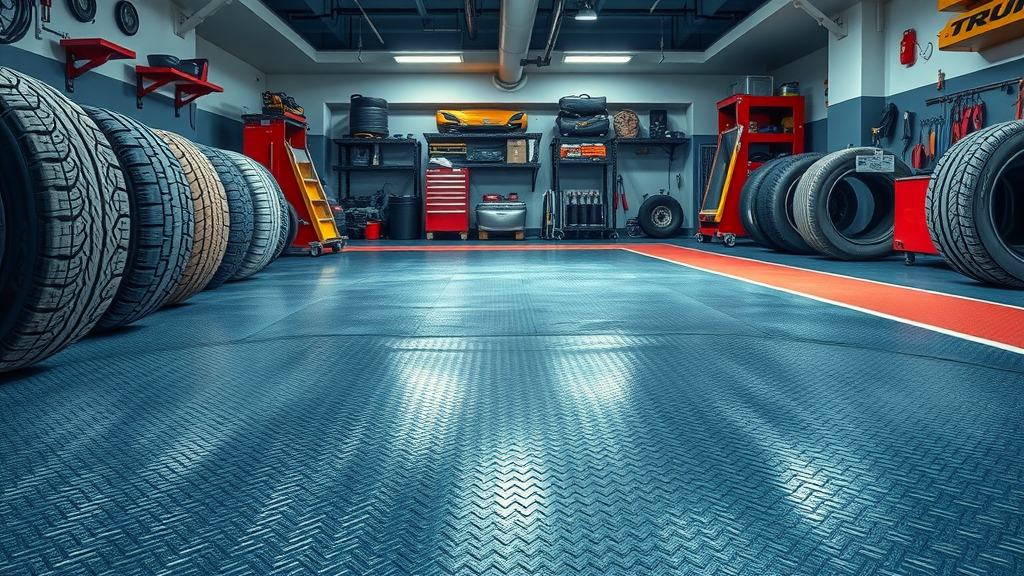
People Also Ask About Garage Floor Waterproofing for Winter
Can you seal a garage floor in the winter?
Answer: Yes, it is possible to seal a garage floor in the winter, but you must choose cold-weather-compatible epoxy floor coatings and follow manufacturer recommendations on temperature ranges.
Is there anything better than epoxy for garage floors?
Answer: Polyurea coatings are often cited as an alternative to epoxy, providing even greater durability and faster cure times for winter garage floor waterproofing projects.
How to keep garage floor dry in winter?
Answer: Combine high-quality waterproof floor coatings with strategically placed floor mats and effective garage drainage to keep your concrete floor dry during winter months.
How do you waterproof a concrete garage floor?
Answer: Prep the garage floor thoroughly, choose a compatible epoxy or polyurethane floor coating, apply as directed, and use additional protection options such as floor mats and snow mats.
Frequently Asked Questions: Garage Floor Waterproofing for Winter
How long does garage floor waterproofing last in winter conditions? Most professional installations of epoxy coating or polyurea can last 5–10 years with proper maintenance—far outlasting simple floor paint or mat-only solutions.
Will waterproofing your garage floor stop all winter damage? While no system is 100% foolproof, the right combination of coatings, mats, and drainage will stop more than 90% of moisture and chemical intrusion in winter.
What is the cost comparison: DIY vs. professional floor coatings? DIY epoxy coating kits start at a few hundred dollars; professional-grade polyurea or multi-layer systems may run $2,500–$5,000+, but provide unmatched durability.
Can I install floor mats and coatings myself in winter? Many mats are DIY-friendly, but for permanent coatings, always check if your chosen product is suitable for cool temperatures. Some require specialized tools or pro application in winter conditions.

Key Takeaways on Garage Floor Waterproofing for Winter
Garage floor waterproofing for winter protects your concrete floor from irreversible damage.
Choosing the right combination of floor coatings, mats, and expert techniques ensures long-lasting results.
Regular maintenance and preparation are vital for winter-proof protection options.
"Winterproofing your garage floor can extend its lifespan by years—saving thousands in future repairs."
Conclusion: Secure Your Garage Floor Investment This Winter
If you want to keep your garage floor looking sharp and performing well, garage floor waterproofing for winter is non-negotiable. Take action now to defend your concrete from moisture, road salt, and freeze-thaw cycles for seasons to come.
Call Us now to get your FREE Quote! 800-280-9210
To enhance your understanding of garage floor waterproofing for winter, consider exploring the following resources:
“How to Prep Your Garage Floor for Winter” by TAGG Concrete Coatings offers practical tips on repairing cracks, applying protective coatings, and using containment mats to shield your garage floor from winter damage. (taggconcretecoatings.com)
“How Do I Protect My Garage Floor from the Snow” by Nels Garage provides insights into increasing garage temperature, proper ventilation, and drainage solutions to maintain a dry and safe garage floor during snowy conditions. (nelsgarage.com)
These articles offer valuable strategies to protect your garage floor from winter’s harsh effects, helping you avoid costly repairs and extend the lifespan of your flooring.
 Add Row
Add Row  Add
Add 

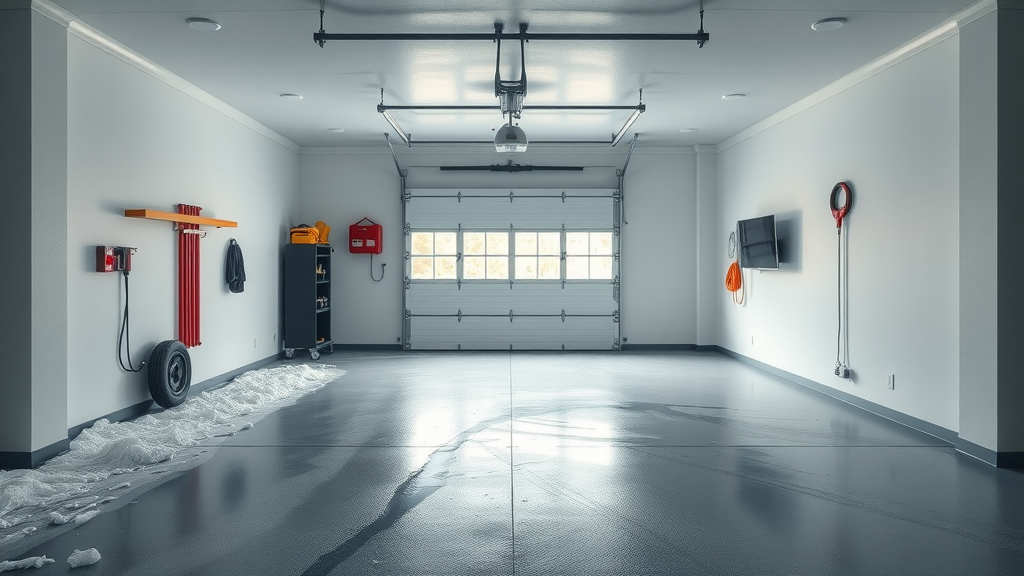
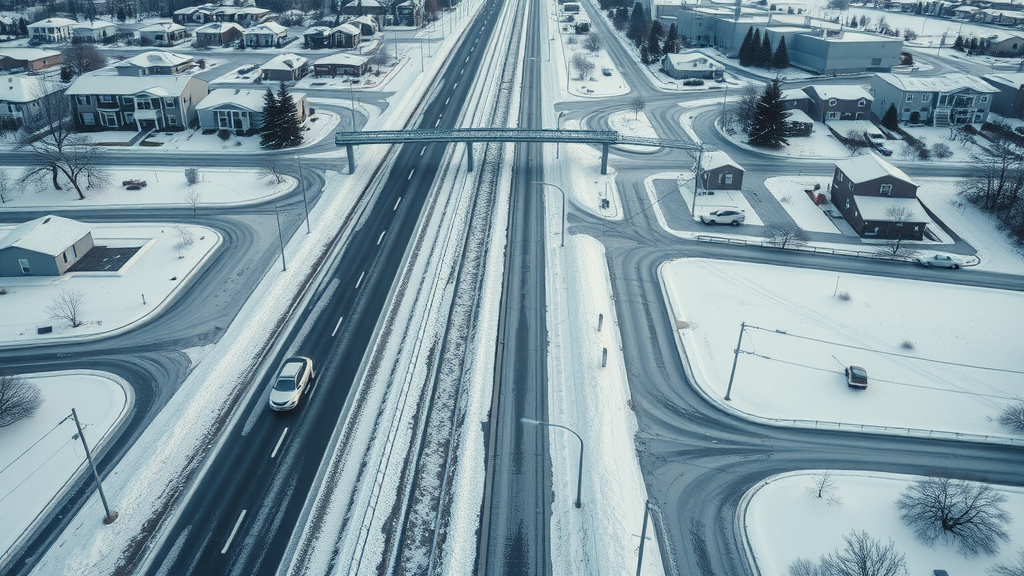

Write A Comment